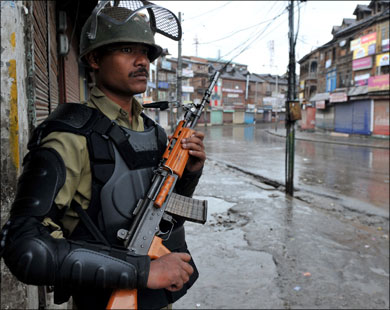Masood Khan, head of Pakistan-controlled Kashmir, said on Saturday that India has worked to settle a group of retired army personnel in its part of Kashmir.
He added in a statement that India is pursuing a deliberate policy to completely convert the lands of Jammu and Kashmir into its colony, explaining that New Delhi has accelerated the process of transferring a vast land to former military officials, to start building military settlements.
Masoud Khan condemned what India was doing in Kashmir, noting that it was the first military colony for the retired army personnel "who slaughtered the Kashmiris."
The statement of the President of Pakistani Kashmir came after reports that the local authorities in the region under the control of Indian forces revealed that 25 acres of the Bodjam area were used to establish the first colony for soldiers in Kashmir.
Reports stated that India began to expedite the process of converting lands into colonies in October.
Residential facilities
On the other hand, the Indian website The Print reported a statement by an unnamed official, who said that the colony is being built to provide housing facilities for retired army members, and their families from Kashmir, and for the widows and families of the deceased armed forces members as well.
The Indian official added that what is being circulated, that the government wants to bring troops from abroad and settle them in the Kashmir region, is incorrect, and that the facilities that are being built for the sake of former soldiers who belong to the Jammu and Kashmir region.
It is noteworthy that the conflict over the Kashmir region began between Pakistan and India since their independence from Britain in 1947, when 3 wars broke out between them, in 1948, 1965 and 1971, which resulted in the deaths of nearly 70 thousand people on both sides.
The name Jammu and Kashmir is given to the part of New Delhi under the control of Kashmir, which includes groups that have been fighting since 1989 against what it considers Indian occupation of its regions.

